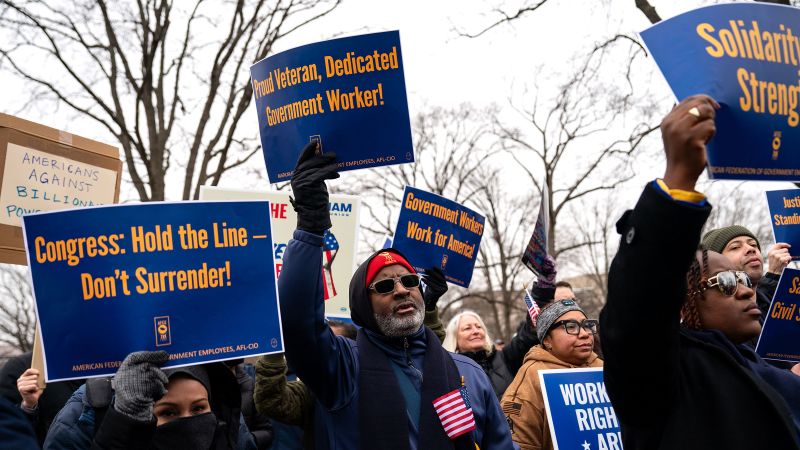CNN
—
A federal judge is halting the Trump administration from carrying out, under a February executive order, mass firings or major reorganizations of multiple agencies going forward.
Senior District Judge Susan Illston on Friday evening granted a temporary restraining order sought by federal employee unions, local governments and outside organizations that rely on federal services, who argued the administration was acting outside the bounds of the law. The judge’s order, which lasts two weeks, blocks the administration’s approval or implementation of plans –- known as Agency RIF and Reorganization Plans, or ARRPs – for conducting mass layoffs and for shrinking or eliminating entire components of an agency. She is also pausing any orders from the Department of Government Efficiency, or DOGE, cutting programs or staff in accordance with Trump’s executive order and the related directives.
Illston, an appointee of former President Bill Clinton who sits in San Francisco, said at a hearing earlier in the day that presidents have authority to make changes to the government, but when it comes to large scale reorganizations, presidents “must do so with the cooperation of Congress.
The unions targeted specifically the role that DOGE was playing in the process, writing in court filings that the Elon Musk-led initiative was acting “largely in secret” to force cuts to agency spending and personnel by “refusing to reveal” the plans “to employees, their labor representatives, the public, or Congress.” The Office of Management and Budget and the Office of Personnel Management – two agencies that have been central to DOGE’s mission – issued a joint directive that agencies submit the reduction and reorganization plans in two stages, due in mid-March and mid-April, with OMB giving final approval of the layoff plans, according to court filings.
Illston’s order is among the most sweeping legal setbacks Trump and DOGE have faced in their efforts to drastically winnow down the federal bureaucracy. Across the federal government, the administration has been in the process of carrying out RIFS – or reductions in force – that would terminate tens of thousands of employees and shutter entire agency offices, with little regard for how the layoffs would impact an agency’s ability to meet its statutory obligations.
The case before Illston could soon head to the Supreme Court, as the Justice Department indicated that it would like to appeal it quickly – though the judge denied a DOJ attorney’s request for a procedural maneuver that would make it easier for the administration to appeal her order immediately.
In a 42-page opinion Friday night, Illston said, “No statute gives OPM, OMB, or DOGE the authority to direct other federal agencies to engage in large-scale terminations, restructuring, or elimination of itself.”
While she will take a closer look at the merits of the lawsuit in the coming weeks, she found “it necessary to temporarily enjoin further implementation of those plans because they flow from likely illegal directives.”
The order covers major reductions at more than a dozen agencies, including the departments of Agriculture, Commerce, Energy, Labor, Treasury, State, Health and Human Services, Veterans Affairs and the Environmental Protection Agency.
It additionally requires the administration to turn over by Tuesday the reduction plans, and to inform the judge by Tuesday about its efforts to carry out her order.
In a statement, the challengers said they were “gratified by the court’s decision today to pause these harmful actions while our case proceeds.”
“With every move this President is making, we are holding him accountable in court, and seeing judges of all stripes recognize and defend the rule of law,” said Skye Perryman, the president and CEO of Democracy Forward, which is representing the challengers.
CNN has reached out to the White House for comment.
DOJ attorney Eric Hamilton argued Friday that the unions’ case suffered from a number of procedural defects, including a delay in bringing it, given that the executive order in question was signed on February 11. He argued that courts did not have the power to oversee challenges to the reduction plans because they were part of deliberative process and not a final agency action.
Danielle Leonard, an attorney for plaintiffs, countered that any delay was the administration’s fault for refusing to be forthcoming with its plans and argued that that the administration was “trying to insulate from judicial review” a “pretty profoundly unlawful set of instructions.”
The judge raised that some senators had asked the administration to produce its layoff plans. She asked the Justice Department if the administration had responded to that request. Hamilton refused to answer, arguing it was irrelevant to the case.
This story has been updated with additional details.
CNN’s Tami Luhby contributed to this report.

